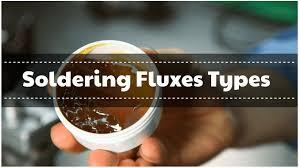Flux Formulations Unveiled: Understanding Different Types of Soldering Fluxes
Body
Soldering fluxes are the unsung heroes of the soldering process, facilitating the formation of strong, reliable joints by preventing oxidation and promoting wetting and bonding between solder and surfaces. Understanding the diverse formulations of soldering fluxes is crucial for achieving optimal results in various soldering applications. Let's delve into the intricacies of flux formulations:
Rosin Flux:
Rosin flux, derived from natural pine resin, is one of the most widely used flux types. It comes in different grades, such as R, RA, and RMA, each offering varying degrees of activity and residue. Rosin fluxes are known for their excellent wetting properties and reliability in electronics soldering applications. They leave behind a tacky residue that requires cleaning post-soldering.
Water-Soluble Flux:
Water-soluble fluxes are formulated with organic acids or activators that dissolve in water, making post-soldering residue removal easier. These fluxes are favored in applications where cleanliness is paramount, such as circuit board assembly in electronics manufacturing. Water-soluble fluxes offer good wetting characteristics and are suitable for both manual and automated soldering processes.
No-Clean Flux:
No-clean fluxes have gained popularity in recent years due to their convenience and environmental friendliness. These fluxes contain low levels of activators and leave behind minimal residue that is non-corrosive and non-conductive. While no-clean fluxes eliminate the need for post-soldering cleaning in many applications, they may require cleaning in certain high-reliability or specialized electronic assemblies.
Activated Rosin Flux:
Activated rosin fluxes, often designated as RA or RMA, contain additional activators or additives to enhance their performance. These fluxes offer improved wetting on difficult-to-solder surfaces, such as oxidized metals or contaminated substrates. Activated rosin fluxes strike a balance between reliability and ease of residue removal, making them suitable for a wide range of soldering applications.
Halide-Free Flux:
Halide-free flux formulations have gained traction due to concerns over the corrosive effects of halide residues, particularly in high-reliability electronic assemblies. These fluxes replace halide-based activators with alternative chemistry while maintaining excellent soldering performance and reliability. Halide-free fluxes offer compatibility with lead-free soldering processes and comply with industry regulations and environmental standards.
Specialized Fluxes:
Beyond the standard formulations, specialized fluxes cater to niche applications with unique requirements. These may include fluxes tailored for specific materials (e.g., aluminum, stainless steel), soldering methods (e.g., wave soldering, reflow soldering), or environmental conditions (e.g., high temperatures, high frequencies). Specialized flux formulations ensure optimal performance and reliability in specialized soldering applications.
In conclusion, soldering fluxes come in a variety of formulations, each tailored to meet specific soldering challenges and requirements. Whether it's achieving excellent wetting, minimizing residue, or ensuring compatibility with environmental standards, selecting the right flux formulation is crucial for achieving high-quality soldered joints in diverse applications. By understanding the characteristics and applications of different flux types, soldering professionals can optimize their soldering processes and achieve superior results.
Revolutionizing Industry: The Future of Thermal Spray Powder Applications
Elevate your projects with India's leading thermal spray powder supplier! Explore our premium solutions today.









Comments